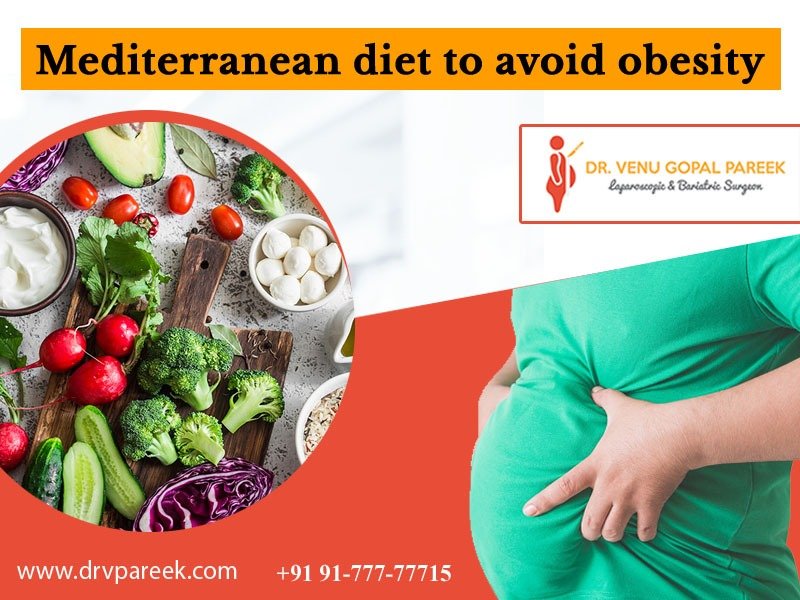
Mediterranean Diet To Avoid Obesity
Mediterranean diet has become a trend in the world of health and wellness. It is said to work wonders for the heart, weight loss, inflammation, and diabetes. If the latest research results are believed, the Mediterranean diet can prevent overeating, obesity and liver disease. The study was published in the journal for obesity.
The Mediterranean diet is not a single diet but inspired by the diets of southern European countries. The focus is on plant foods, olive oil, fish, poultry, nuts and seeds. This diet combines everyday dietary habits and healthy habits from various regions, including Greece, Spain, southern France, Portugal and Italy.
Studies show that people who live or eat a Mediterranean diet in the Mediterranean are at a lower risk of developing various diseases, including obesity, diabetes, cancer and cardiovascular disease. They are also more likely to live longer than people in other areas.
This diet’s main ingredients are fresh fruits and vegetables, unsaturated fats and oils, fish, moderate milk intake, and low meat and added sugar consumption. Research has linked these factors to positive health outcomes.
Let us see more about Mediterranean diet to avoid obesity provided by Dr Venu Gopal Pareek.
What is the Mediterranean diet?

The Mediterranean diet is a typical diet for many Mediterranean countries such as Spain, southern Italy, and Greece. It mainly consists of whole grains, unrefined cereals, vegetables (including greens, green leafy vegetables), legumes, fresh fruits (consumed as a dessert or snack), and nuts. Also includes moderate amounts of fish (twice a week or more), poultry, dairy products (cheese and yoghurt), olive oil (not butter), wine, and a small amount of red meat (two to three times a month). Olive oil is the primary source of fat. Eating eggs, processed meat (such as bologna and hot dogs), and pastries are not recommended. It is advisable to drink lots of water. The use of herbs and spices instead of salt is also recommended.
Although the Mediterranean diet does not limit fat intake, the fat a person consumes is essential. Hydrogenated oils and saturated fats (“trans fats”), which cause heart disease, are avoided. The primary source of fat in the Mediterranean diet is the use of Olive oil. Olive oil is a monounsaturated fat; These fats help lower the “bad” cholesterol called LDL when used instead of saturated or trans fats. Monounsaturated fats and nuts contain linolenic acid, a type of omega-3 fatty acid. Omega-3 fatty acids lower cholesterol, lower heart disease, and lower blood pressure.
Mediterranean Diet and Obesity

The relationship between the Mediterranean diet and obesity is complicated. Although research suggests a link between the Mediterranean diet and obesity prevention, the results are inconsistent.
The Mediterranean diet is a way of life. This is not a fad diet. Weight loss is slow and steady, and dieting is the pathway to healthy eating and better food choices throughout your life. It helps in weight loss and prevents obesity-related diseases.
What to Eat on a Mediterranean Diet
- Eat vegetables and fruit. The diet should consist primarily of plant foods. Try to get at least seven servings a day.
- Eat whole wheat bread and muesli as well as whole wheat pasta and rice.
- Eat more nuts, especially walnuts, almonds and hazelnuts, Pistachios, cashews, and natural peanut butter can be included.
- Use olive oil instead of butter. Use for cooking. Sprinkle it over whole wheat bread instead of butter.
- Use herbs and spices to add flavour to food rather than salt.
- Eat fish at least twice a week; Tuna and salmon are good choices. Avoid fried food.
- Eat more poultry and less red meat. Keep your red meat intake the size of a small fist only 2-3 times a month.
- Eat low-fat dairy products. Avoid whole milk and high-fat cheeses. Drink low-fat or low-fat (1% or 2%) milk and eat low-fat cheese.
- Drink a small glass of wine (preferably red) with dinner if your obesity doctor agrees. If you don’t drink now, don’t start. Diet doesn’t need it.
Foods to avoid:

Here are some foods to limit or avoid as part of your Mediterranean diet:
- Processed meats: Bacon, salami, sausages, hot dogs
- Processed grains: White bread, biscuits, white pasta, flour tortillas, white rice
- Sugar-sweetened drinks: Juices, sodas, energy drinks, sports drinks
- Refined oil: Vegetable oil, soybean oil, rapeseed oil, corn oil, saffron oil
- Processed foods: Fast food, french fries, fast food, microwave popcorn, pretzels
- Added sugar: Table sugar, ice cream, candy, pastries, baked goods, ice cream
Nutrition

A focus on plant-based foods and fresh produce foods are Mediterranean diets. This contains many vital nutrients and food groups, such as:
- Healthy fats: A diet low in saturated fat and high in monounsaturated fat. Doctors recommend limiting saturated fat intake to avoid high cholesterol, obesity, and cardiovascular disease.
- Fibre: A diet high in fresh fruits and vegetables, as well as whole grains and legumes, is high in fibre. Fibre promotes healthy digestion and appears to reduce the risk of colon cancer and cardiovascular disease. It can also reduce the risk of type 2 diabetes.
- Vitamins and Minerals: Fruits and vegetables provide the vitamins and minerals the body needs to function correctly. Lean meat also includes vitamin B-12, which is less than a whole plant diet.
- Antioxidants: Antioxidants include Minerals, vitamins, and other molecules that can help remove free radicals from the body. Free radicals are toxic molecules that can accumulate as a byproduct of metabolism and other processes. These free radicals cause damage that can lead to cancer and other diseases. Dietary antioxidants protect the body by eliminating free radicals, and plant foods are good sources of antioxidants.
- Low Sugar: Fresh fruit provides natural sugars, but the diet is low in sugar. Added sugar causes high calories and increases the risk of obesity and its complications. The American Heart Association (AHA) recommends limiting added sugar intake to 6 teaspoons per day for women and nine teaspoons per day. This corresponds to 24 g or 36 g. Instead of sweet pastries, people eat the fruit of the Mediterranean diet. The fruit contains sugar, but the fruit is useful in moderation. Find out about some healthy fruits here.
However, the Mediterranean Diet is a holistic way of eating, not a special diet.
Conclusion:
Fruits, vegetables, healthy fats, whole grains, and minimally processed protein sources can all be enjoyed as part of the Mediterranean diet. Added sugars, Processed foods, and refined grains should be limited.
In overweight or obese people, a Mediterranean diet for at least one year leads to more significant weight loss than a low-fat diet and weight loss similar low-carb diet. For more information, contact Dr Venu Gopal Pareek at 091777 77715.






